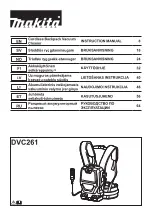
11 ENGLISH
FUNCTIONAL
DESCRIPTION
CAUTION:
Always be sure that the tool is
switched off and the battery cartridge is removed
before adjusting or checking function on the tool.
Installing or removing battery
cartridge
CAUTION:
Always switch off the tool before
installing or removing of the battery cartridge.
CAUTION:
Hold the tool and the battery car-
tridge firmly when installing or removing battery
cartridge.
Failure to hold the tool and the battery
cartridge firmly may cause them to slip off your hands
and result in damage to the tool and battery cartridge
and a personal injury.
►
Fig.1:
1.
Red indicator
2.
Button
3.
Battery cartridge
To remove the battery cartridge, slide it from the tool
while sliding the button on the front of the cartridge.
To install the battery cartridge, align the tongue on the
battery cartridge with the groove in the housing and slip
it into place. Insert it all the way until it locks in place
with a little click. If you can see the red indicator on the
upper side of the button, it is not locked completely.
CAUTION:
Always install the battery cartridge
fully until the red indicator cannot be seen.
If not,
it may accidentally fall out of the tool, causing injury to
you or someone around you.
CAUTION:
Do not install the battery cartridge
forcibly.
If the cartridge does not slide in easily, it is
not being inserted correctly.
Tool / battery protection system
The tool is equipped with a tool/battery protection sys-
tem. This system automatically cuts off power to the
motor to extend tool and battery life. The tool will auto-
matically stop during operation if the tool or battery is
placed under one of the following conditions.
Overload protection
When the tool is operated in a manner that causes it to
draw an abnormally high current, the tool automatically
stops without any indication. In this situation, turn the
tool off and stop the application that caused the tool to
become overloaded. Then turn the tool on to restart.
Overheat protection
When the tool is overheated, the tool stops automatically.
Let the tool cool down before turning the tool on again.
Overdischarge protection
When the battery capacity becomes low, the tool stops
automatically. If the product does not operate even
when the switches are operated, remove the batteries
from the tool and charge the batteries.
Indicating the remaining battery
capacity
Only for battery cartridges with the indicator
►
Fig.2:
1.
Indicator lamps
2.
Check button
Press the check button on the battery cartridge to indi-
cate the remaining battery capacity. The indicator lamps
light up for a few seconds.
Indicator lamps
Remaining
capacity
Lighted
Off
Blinking
75% to 100%
50% to 75%
25% to 50%
0% to 25%
Charge the
battery.
The battery
may have
malfunctioned.
NOTE:
Depending on the conditions of use and the
ambient temperature, the indication may differ slightly
from the actual capacity.
Switch box position
The switch box can be hooked on either side of the
lower belt. Arrange the cord so that the switch box
comes to your desired side. To prevent the cord from
being damaged, pass the cord through the hook as
illustrated.
►
Fig.3:
1.
Hook
2.
Cord
Adjusting belts
The tightness of the shoulder belts, upper and lower
belts can be adjusted. Put your arms through the shoul-
der belts first then fasten the lower and upper belts.
To tighten, pull the end of the strap as illustrated. To
loosen, pull up the end of the fastener.
Lower belt
►
Fig.4:
1.
Strap
2.
Fastener
Shoulder belts
►
Fig.5:
1.
Strap
2.
Fastener
Upper belt
►
Fig.6:
1.
Strap
2.
Fastener
Carrying hook
Always grab the carrying hook when handling the vac-
uum cleaner body.
►
Fig.7:
1.
Carrying hook
Summary of Contents for DVC261TX25
Page 2: ...1 2 3 Fig 1 1 2 Fig 2 1 2 1 2 Fig 3 1 2 Fig 4 2 1 Fig 5 1 2 Fig 6 1 Fig 7 2...
Page 3: ...Fig 8 Fig 9 1 2 3 Fig 10 1 2 Fig 11 Fig 12 1 2 Fig 13 1 2 3 4 Fig 14 3...
Page 4: ...2 1 3 4 Fig 15 1 Fig 16 1 2 3 Fig 17 1 Fig 18 1 2 3 4 4 Fig 19 1 2 Fig 20 4...
Page 5: ...2 1 1 3 Fig 21 4 1 3 2 Fig 22 1 2 3 Fig 23 1 2 Fig 24 1 2 Fig 25 2 1 3 Fig 26 5...
Page 6: ...3 2 1 4 1 Fig 27 Fig 28 Fig 29 2 1 Fig 30 1 Fig 31 1 Fig 32 Fig 33 6...
Page 7: ...1 2 3 4 Fig 34 Fig 35 4 1 3 2 Fig 36 1 2 3 Fig 37 7...
Page 65: ...65 EN60335 2 69 ah 2 5 2 K 1 5 2 A 1 2 3 4 ON OFF 5 6 7 8 9 10 11 12 13 14 15 16...
Page 66: ...66 17 18 19 20 21 22 23 24 25 26 27 28 1 2 3 4 5 6 130 C 7 1 2 3 1 1 2 3 2 3 4 5 1 2 3...
Page 71: ...71 1 28 2 29 D 30 1 D 2 3 31 1 32 1 Makita Makita HEPA...
Page 72: ...72 1 33 2 1 2 3 34 1 2 HEPA 3 4 35 36 1 2 3 4 37 1 2 3 Makita Makita T HEPA Makita...
Page 73: ...73...
Page 74: ...74...
Page 75: ...75...












































